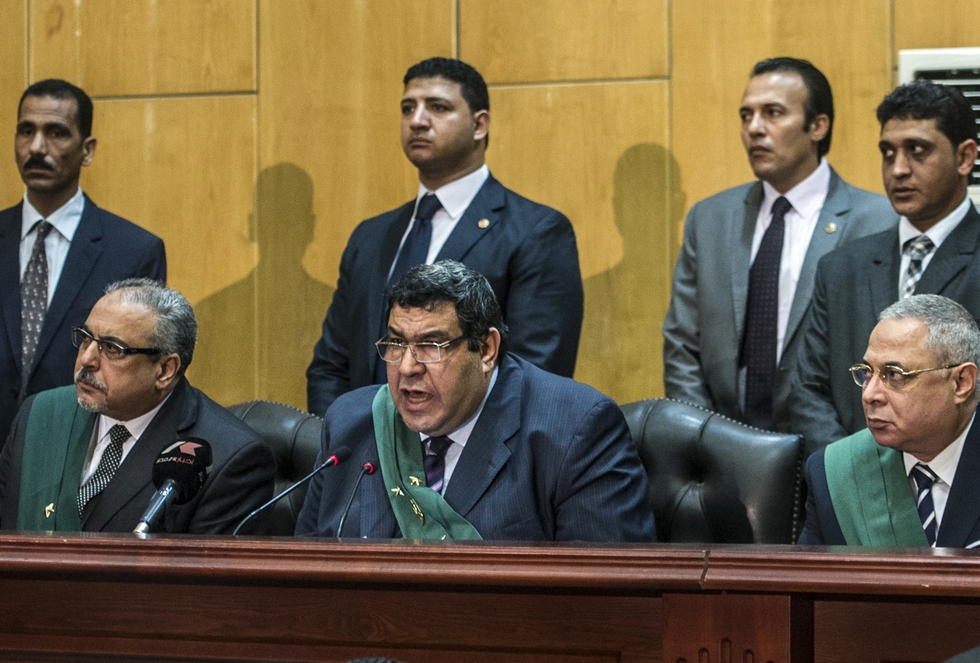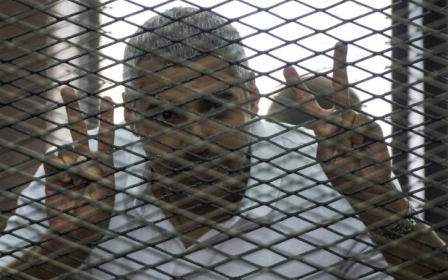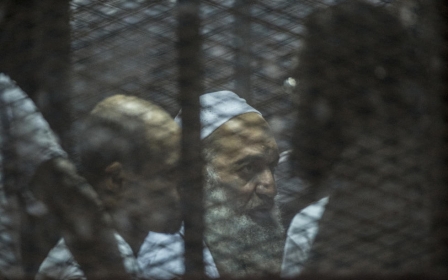Egypt's judiciary cracks down on criticism

Many videos and photos on the internet feature Egyptian judges having “angry” episodes with the defendants in the courtroom. One such scene marked the first session of the case known as the “Rabaa control room” on 1 April 2014.
“Shut up! Do not speak at all!” the judge shouted.
“This is not right! I have a right to hear the judge,” the defendant answered back after objecting to not being able to hear court proceedings from the cage.
“Do not speak. I am warning you!”
“The judge should not say ‘shut up’!”
“You will shut up because you are indecent!”
“This is not appropriate! I am a university professor and a law graduate.”
When the defendant’s lawyer intervened and convinced his client to stop, Judge Nagy Shehata, with his sunglasses and hoarse voice, turned to him asking, “Why are you speaking, bey? Did I allow you to speak?”
The lawyer addressed the panel, criticising how Shehata spoke to his defendant. However, amid arguments, the courtroom quickly erupted into chaos.
Judicial sources at the time had said that lawyers withdrew from the session in protest. The defence team had demanded the incident be detailed in the court transcript, but Shehata rejected this and continued with the trial.
However, what happened was indeed recorded by a mobile camera and circulated online.
Shehata had told the objecting lawyer, “He is indecent and did not respect himself. Did he respect his presence in a courtroom?”
‘Chaotic scene’
Egypt’s judges have recently been brought into public debate, particularly on social media platforms, not just for an increase in harsh verdicts like mass death sentences, but also for incidents involving verbal altercations with lawyers or defendants who often voice injustice.
However, judges seem increasingly defensive, unaltered by critics, and referring more people to trial over charges of “insulting the judiciary” - for breaking laws during a court hearing or even commenting on verdicts.
“This undermines confidence and increases concern over the justice system in Egypt,” Gamal Eid, head of the Arab Network for Human Rights Information (ANHRI) said.
On 9 August, a court in Upper Egypt’s Minya sentenced eight lawyers in absentia to 25 years in prison, and one lawyer, who was present in court, to three years, all on charges of "insulting the judiciary and rioting in the court house”.
The lawyers’ syndicate was notably alarmed, setting up a special team to take legal action against the verdict. Head of the syndicate Sameh Ashour told local media he had also met with Justice Minister Ahmed El-Zend to discuss what he described as an “unprecedented” incident.
Another trial is currently ongoing in Egypt involving 25 people, including Islamists and secular activists, also over insulting the judiciary and mainly dealing with incidents of comment on verdicts or judges.
Recent discussions by users on social media platforms have tackled the work of judges in Egypt, calling for “humanising” their work rather than shielding it from criticism and challenging common misconceptions while still securing an impartial judicial process.
Meanwhile, lawyers and rights advocates assert that Egypt’s constitution stipulates that all judicial verdicts are issued and implemented “in the name of the people”.
“Every citizen has the right to speak of the flaws they see in the justice system,” Eid said, “Judiciary is owned by the Egyptians and citizens have to feel confident in its work.”
What is really not allowed?
Egypt’s judiciary is treated with special care in local media. Hearing the phrases like “no comment on judges’ verdicts” and “the judiciary is a red line” have almost become a mantra in TV channels and newspapers, shielding the heads of courthouses against public dissent.
However, nothing in the Egyptian law actually prohibits “commenting” on judicial verdicts.
It all started when Egypt’s Supreme Judiciary Council [Magles Al-Qadaa’ Al-A’la] released a statement in September 2007 warning against making such comments.
The statement had said that commenting on legal verdicts “in newspapers and magazines with praise or criticism is not allowed, especially if the verdict is appealed, as this would be considered a form of influencing the judiciary and interfering in its work”.
It has been used since then in media and public commentary, particularly from pro-government figures, to prevent negative comments on controversial legal verdicts, making it a mistaken belief among the audience.
“This statement does not have any legal basis,” said Negad El-Borei, lawyer and head of United Group of Attorneys at Law, Legal Advisors and Human Rights Advocates. The statement - legally - cannot lead to anyone’s arrest or punishment.
Meanwhile, Egypt’s penal code has articles that mainly criminalise “insulting” a court or a judge during session, insulting a judge presiding over a trial, disrupting a judge’s status or authority in the lawsuit process, and insulting judges through spreading “things” that could influence the verdict.
The penal code also criminalises insulting or threatening a public servant and also anyone who insults.
Under most of these articles in the penal code the punishment ranges from six months to one year and/or a monetary fine.
Lawyers assert that criticising a verdict is not punishable by law, but insulting a judge is.
“So I can say that a verdict is politicised, or had violated the law or is unjust - there isn’t a crime here,” Eid said.
“And I can say that a judge was not specialised and call for investigating him,” El-Borei also pointed out, “but I cannot say that a judge took a bribe for this verdict or the court is corrupt for example.”
El-Borei also said that articles in the penal code deal with court “proceedings” and not “results”. He says the law protects the process of obtaining justice from obstruction, but not its outcome.
‘Insults’
However, Egypt’s increasingly “glorified” judges have referred many people to trial over “insulting the judiciary” in cases deemed by some as unjustified.
El-Borei adds that the last year has witnessed an increase in cases involving charges of insulting the judiciary. He said he only remembers one case they used to study in university from the mid-twentieth century involving such a charge.
Today, 25 people were grouped in a trial over “insulting the judicial authority and its men with the purpose of spreading hatred” though the incidents each is being questioned over are separate.
Lawyers who are on the defense team or who follow the trial said they “did not understand” why the defendants were grouped even though each is summoned for different incident at separate places and times.
Meanwhile, the defendants include former president Mohamed Morsi, leading Muslim Brotherhood figure Mohamed El-Beltagi, academic and ex-MP Amr Hamzawy, liberal activist Alaa Abd El-Fattah and Nasserist columnist Abd El-Halim Qandil. The second session of this mass trial is set for 1 October.
For example, Hamzawy was reportedly charged over writing a tweet in June 2013 criticising verdict against 27 NGO workers in absentia to five-year jail sentences. He said the verdict was “shocking, not transparent, clearly political and lacked documented information”.
Lawyers have argued that such comments bear no insult, but reflect personal opinion.
Hamzawy had been barred from travel over these comments, but the ban was lifted in October 2014. Eid, who said he had attended prosecution questioning with Hamzawy, said they were “surprised” to find him among the defendants in the new mass trial.
Eid said he views charges in the trial as “narrow interpretations” of the people’s comments.
However, not all defendants in the trial share the same situation.
Taher Abo El-Nasr, lawyer and member of Alaa Abd El-Fattah’s defense team, makes a distinction between commenting on a verdict and making unfounded accusations about a court or a judge.
“For example, I cannot say that a court or a judge are corrupt if I do not have empirical proof to support my claim,” he said. “For normal citizens this is considered libel and defamation.”
In the same case, ex-president Morsi has been called to the trial over making comments in a televised public speech while in office in June 2013 naming a specific judge and accusing him personally of forgery.
However, on the other hand, what happens when a judge runs a courtroom in ways seen insulting to defendants?
Lawyer Taher Abo El-Nasr, who is on activist Alaa Abd El-Fattah’s defense team, said that the incident has to be documented in the court transcript – something which he also said rarely happens.
Seeking balance
While many judges in Egypt maintain the public discourse shielding the legal system from criticism, some others share a more balanced view.
Judge Mohamed Hamed El-Gamal, former head of the State Council and a constitutional expert, objected to bringing legal verdicts to public discussion at all, saying they should only be tackled by experts.
“Commenting on a verdict requires a deep and adequate knowledge to be able to assess it,” he said, “This is to fulfil respect for the law.”
“[This should] not be allowed for the mob-like commons who ridicule and insult verdicts,” he added.
However, not everyone shares the same view.
Ashraf El-Baroudy, a judge at the Cairo Appeals Court, gives a more progressive perspective.
He is lenient against leaving judges and verdicts open to a wide public discussion. However, he believes that punishments put in place for such instances are an exaggeration.
“I am against being strict and widening the scope of trying people under this accusation,” he said, “I believe that the so-called crime of insulting the judiciary should be limited to incidents that happen inside the courtroom and within limited parameters.”
He also added that he tends to be against harsh punishments for such offences, namely deprivation of freedom punishments, suggesting limited monetary fines as an alternative.
The 2007 statement had said that “comment” on verdicts is only allowed through two methods. The first, it said, was a legal appeal in court. And the second was an “expert” comment in a legal publication after no more appeals can be made in court.
Commenting on that, El-Borei criticised it saying that part of the idea of commenting on judicial verdicts is making people more legally aware.
“No one is supposed to be ignorant of the law,” he said, “[Comments] have to be in newspapers and TV and so on.”
Critics argue that judges’ work is human work and all human work should be open for discussion and criticism.
El-Borei says that the only way is to continue “speaking out and writing” against misconceptions promoted about shielding the judiciary from public comment.
“This is how change happens; what can we do?” he said.
Stay informed with MEE's newsletters
Sign up to get the latest alerts, insights and analysis, starting with Turkey Unpacked
Middle East Eye delivers independent and unrivalled coverage and analysis of the Middle East, North Africa and beyond. To learn more about republishing this content and the associated fees, please fill out this form. More about MEE can be found here.




